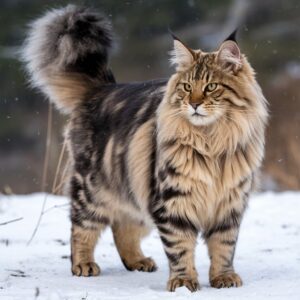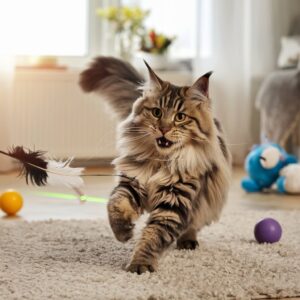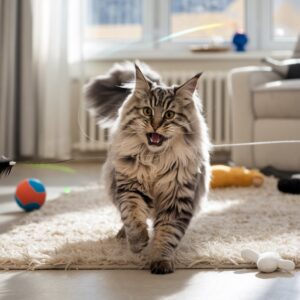Ultimate Care Strategies for Your Maine Coon Cat: Ensuring Health and Happiness
The magnificent Maine Coon cat is not just a pet; it’s a remarkable companion that has enchanted cat lovers for generations. Known for their impressive size and charming facial features, these felines hail from the cold, scenic state of Maine. Adapted to frigid climates, Maine Coons showcase features such as thick, bushy tails that resemble cozy winter scarves, tufted ears adding to their distinctive appeal, and a luxurious coat that comes in an astonishing variety of colors. Their robust physique, defined by large, muscular paws, plays a crucial role in their ability to survive in harsh environments. Resembling small lions, these cats are superbly equipped to thrive in snowy landscapes, making them both beautiful companions and resilient survivors.
One of the most captivating aspects of Maine Coons is their enchanting blend of personalities, which effortlessly draws people in. Their social nature often resembles that of dogs, prompting many to describe these cats as having dog-like characteristics. This observation is far from casual; it reflects their genuine loyalty and affectionate demeanor, which sets them apart in the feline realm. When a Maine Coon chooses to bond with you, it feels like winning the jackpot in pet companionship! Beyond their loving disposition, these cats are incredibly intelligent and playful. Witnessing a Maine Coon master a puzzle toy is akin to watching a chess game unfold, highlighting their strategic thinking and problem-solving abilities in an engaging way.
Often affectionately dubbed “gentle giants,” Maine Coons display a calm and serene demeanor that can easily trick you into underestimating their playful spirit. They are natural explorers at heart, embodying the playful energy of children with seemingly endless enthusiasm. It’s not unusual to see them gazing at you with their wise, almost mystical eyes before suddenly launching into an energetic sprint around the house, whimsically knocking over objects in their path like furry little wrecking balls. Their vocalizations are distinctive; they often opt for chirps and trills instead of conventional meows, as if they are engaging in an ongoing conversation about everything from their latest meal to the weather outside.
Combining robust physical attributes, sharp intellect, and captivating personalities, Maine Coons truly represent an exceptional breed in the cat world. It’s no surprise that they hold a special place in the hearts of cat enthusiasts. Each Maine Coon is like a rare gem, showcasing its own unique personality and quirks, constantly surprising you just when you think you’ve got them all figured out.
Essential Knowledge for Maine Coon Cat Owners: Key Takeaways
- Maine Coon cats are renowned for their large size, friendly personalities, and remarkable intelligence, making them ideal companions for families seeking a loving pet.
- Providing a balanced diet rich in high-quality protein, along with ensuring adequate hydration, is crucial for maintaining the health and vitality of Maine Coon cats.
- Regular grooming practices, including brushing and nail trimming, are essential to keep the Maine Coon’s thick, water-repellent coat in optimal condition.
- As active and playful creatures, Maine Coons require a wealth of toys and opportunities for exercise to support their overall well-being.
- Routine veterinary check-ups and vaccinations are vital for monitoring the health of Maine Coon cats, particularly since they may be predisposed to certain genetic health conditions.
 Understanding the Nutritional Needs and Diet Essentials for Maine Coon Cats
Understanding the Nutritional Needs and Diet Essentials for Maine Coon Cats
Feeding your Maine Coon cat requires a nuanced approach that takes into account their unique nutritional needs, influenced by factors such as size—after all, they are one of the largest domestic cat breeds—age, and activity levels. Maine Coons typically expend more energy than standard house cats, which means their food intake needs to be more substantial. However, it’s not solely about the quantity; the quality of their diet is equally crucial. A well-balanced meal that emphasizes high-quality protein sources is vital for maintaining their muscle mass and overall health. By ensuring that your Maine Coon receives the right nutrients, you can support their vitality and well-being.
Many seasoned cat owners and veterinarians advocate for diets rich in animal-based proteins, such as chicken, turkey, and fish. These protein sources are essential as they provide the necessary amino acids that fuel their energy and support the maintenance of their substantial muscle structure. Don’t underestimate the importance of healthy fats in their diet! These fats contribute to the luster of a Maine Coon’s gorgeous coat, keeping it shiny and healthy, much like a model’s hair after a professional conditioning treatment. A balanced diet not only enhances their physical appearance but also supports their internal health.
Hydration is another critical aspect of a Maine Coon’s diet. These cats are particularly susceptible to urinary tract issues, making it essential to ensure adequate water intake. Always provide your Maine Coon with easy access to fresh, clean water. Some owners have found success in incorporating wet food into their cat’s diet, as this not only adds moisture but also diversifies their meals, preventing boredom with repetitive kibble. Wet food can serve as an exciting treat that keeps their palate engaged while also aiding in hydration, essential for their overall health.
For those committed to optimizing their Maine Coon’s health, consulting a veterinarian to establish a tailored feeding plan can be immensely beneficial. Veterinarians can provide personalized recommendations based on your cat’s specific needs, including age, weight, and any existing health concerns. Regularly monitoring their weight and adjusting their diet as they grow older or become more active is crucial in preventing obesity, which can be a common issue for these large felines if not managed properly. Taking these steps ensures that your Maine Coon remains healthy and vibrant.
Expert Tips for Comprehensive Grooming and Coat Care for Maine Coon Cats
Maintaining the stunning coat of a Maine Coon cat necessitates dedicated grooming practices that ensure their fur remains in excellent condition while minimizing shedding and reducing the occurrence of hairballs, especially for those long-haired individuals. One of the most effective strategies is to increase brushing frequency during shedding seasons, which typically occur in the spring and autumn. However, grooming extends beyond simply brushing their fur; it’s equally important to pay attention to their eyes, ears, and dental health to ensure a well-rounded grooming routine.
Regularly cleaning their large ears with a veterinarian-recommended solution can help prevent the build-up of wax and debris, which could lead to more serious health issues if neglected. It’s also crucial to watch for any unusual discharge from their eyes; signs of redness or excessive tearing may require further investigation by a veterinary professional. Additionally, maintaining excellent dental hygiene is vital; incorporating regular tooth-brushing into your Maine Coon’s routine, along with providing dental treats, can significantly reduce the risk of periodontal disease. These preventative measures can lead to a healthier and happier pet.
Engaging in regular grooming sessions not only contributes to your Maine Coon’s health but also provides a wonderful opportunity for bonding. These moments together enhance your pet’s comfort and overall well-being while fostering a deeper connection between you and your feline friend. The grooming process can be a calming experience for both you and your Maine Coon, reinforcing trust and affection.
 Fostering Exercise and Playtime for Happy Maine Coon Cats
Fostering Exercise and Playtime for Happy Maine Coon Cats
Maine Coon cats flourish with regular exercise due to their energetic disposition and playful nature. Engaging in physical activity offers numerous benefits, including effective weight management and mental stimulation, which reduces the likelihood of behavioral issues stemming from boredom. Utilizing feather wands or laser pointers can effectively keep these playful felines entertained and physically active, ensuring they remain engaged and joyful.
Considering their natural curiosity and love for exploration, it’s essential to provide Maine Coons with climbing structures such as tall cat trees. These additions to their environment not only satisfy their climbing instincts but also encourage active play. Establishing a routine for dedicated playtime each day can significantly enhance their happiness and well-being. Maine Coons particularly enjoy games that challenge their intellect, such as puzzle feeders or treat-dispensing toys that require them to think critically and solve problems, providing both mental and physical challenges.
Regular exercise not only helps maintain their physical shape but also strengthens the bond between you and your Maine Coon through shared activities. Observing their preferences during playtime can help you tailor activities to suit their interests; some may prefer chasing toys, while others might enjoy interactive games that involve their human companions. By creating an enriched environment filled with opportunities for play and exercise, you’re contributing to your Maine Coon’s overall happiness and mental stimulation, leading to a more fulfilling companionship.
Ensuring Optimal Health Care and Routine Veterinary Visits for Maine Coon Cats
To guarantee the long-term health and vitality of your Maine Coon cat, prioritizing preventative care and maintaining regular veterinary appointments is essential. Like all breeds, Maine Coons can be susceptible to certain hereditary conditions, including hypertrophic cardiomyopathy (HCM), hip dysplasia, and spinal muscular atrophy (SMA). Scheduling regular veterinary check-ups facilitates early detection of potential health issues, allowing for timely intervention and management, which is vital for their well-being.
In addition to routine examinations, preventative measures such as vaccinations, parasite control, and regular blood screenings play a critical role in maintaining your Maine Coon’s health. It’s equally important for cat owners to be vigilant regarding their pet’s behavior and health at home. Subtle changes in appetite, energy levels, or elimination habits may indicate underlying health concerns that warrant further investigation. Being attentive to these changes can make a significant difference in your cat’s overall health.
Maintaining a healthy weight is crucial for this breed, as obesity can exacerbate or lead to new health problems. By keeping an open line of communication with your veterinarian and educating yourself about the specific health challenges faced by Maine Coons, you can take proactive steps to ensure your pet’s health and longevity. This partnership with your veterinary care provider is essential in navigating any health concerns that may arise.
 Creating a Stimulating and Enriching Environment for Your Maine Coon Cat
Creating a Stimulating and Enriching Environment for Your Maine Coon Cat
To ensure your Maine Coon cat remains happy and mentally stimulated, an enriched living environment is essential. These intelligent and curious felines thrive when provided with ample opportunities for play, exploration, and interaction with their surroundings. Incorporating climbing shelves, engaging toys, and scratching posts can significantly reduce unwanted behaviors, such as chewing on furniture or excessive scratching, which often stem from boredom and lack of stimulation.
Maine Coons are naturally curious and enjoy interacting with new toys and experiences. For those who can provide safe outdoor playtime, consider creating a “catio” or supervising outdoor excursions to protect them from potential hazards like traffic or other animals. Engaging activities such as hiding treats around the house or setting up small obstacle courses can also be excellent for keeping them engaged and cognitively stimulated. These activities can provide both physical and mental challenges, enriching their lives.
By paying attention to the specific needs of Maine Coons, owners can create a nurturing environment that fosters happy and healthy lives for their beloved pets. Tailoring the environment to meet their natural instincts and preferences will lead to a more content and well-adjusted cat.
Successful Training and Socialization Techniques for Maine Coon Cats
Training and socialization are crucial components for ensuring that your Maine Coon cat grows up to be a well-adjusted and happy companion. Despite their independent nature, these cats are highly trainable due to their intelligence and eagerness to please. Basic commands like “sit,” “stay,” and “come” can be effectively taught using positive reinforcement techniques, such as treats and verbal praise. This approach not only enhances learning but also strengthens the bond between you and your pet.
Starting training early not only enhances the human-animal bond but also instills positive behaviors from a young age. Consistency is key; shorter, more frequent training sessions tend to be more effective than longer, infrequent ones. Equally important, especially during the initial months of a Maine Coon’s life, is the process of socialization. Exposing them to a variety of people, animals, and environments early on fosters confidence and adaptability.
Gradually introducing them to new experiences, such as meeting other pets or visiting new locations, can help prevent the development of anxiety or fear as they mature. By emphasizing training and socialization from a young age, owners can cultivate Maine Coons that are not only loving companions but also fearless explorers. This foundation sets the stage for a happy and well-adapted adult cat.
Common Questions About Maine Coon Cats Answered
What is the average lifespan of a Maine Coon cat?
The average lifespan of a Maine Coon cat ranges from 12 to 15 years, although some individuals may live well into their late teens with the right care and attention.
What grooming requirements do Maine Coon cats have?
Maine Coon cats possess a thick, water-repellent coat that necessitates regular grooming. It’s recommended to brush them at least a few times a week to prevent matting and reduce shedding, ensuring their coat remains healthy and manageable.
Are Maine Coon cats prone to specific health issues?
While Maine Coon cats are generally healthy, they can be prone to certain genetic health concerns, including hip dysplasia, hypertrophic cardiomyopathy, and spinal muscular atrophy. Regular veterinary care is essential for monitoring their health and addressing any concerns that may arise.
What type of diet is best for Maine Coon cats?
Feeding Maine Coon cats a high-quality, balanced diet tailored to their age, activity level, and any health issues is crucial. Monitoring their weight and adjusting their diet as necessary can help prevent obesity and maintain their overall health.
How much physical activity do Maine Coon cats need?
Maine Coon cats are an active and playful breed, benefiting from regular playtime and interactive toys to keep them mentally and physically engaged. Providing climbing structures or cat trees is also beneficial for fulfilling their natural instinct to explore and climb.
The article: Caring for Maine Coon Cats the Right Way appeared first on Unity Pets.
The article Maine Coon Cats: The Right Way to Care for Them was found on https://limitsofstrategy.com.

I’ve always been fascinated by Maine Coons and their unique personalities! I have a Maine Coon mix named Oliver, and he’s the most social little guy. I love how they have these playful, dog-like traits that seem to bond them closely with their owners. Also, it’s interesting to consider how their physical adaptations not only help them survive in the cold but also make them such intriguing companions. I wonder how their adaptability influences their behavior in our homes compared to their wild ancestors. Have any other Maine Coon owners noticed different personality traits based on their upbringing or living environment? Would love to hear everyone’s thoughts!
Maine Coons really do have a charm all their own, don’t they? It’s lovely to hear about Oliver and how social he is. You’re right—these cats can have such delightful dog-like traits, forming those strong bonds with us that make them feel more like companions than just pets.
I really appreciate how you captured the essence of Maine Coons! Their adaptability is such an intriguing aspect of their personality and physicality. I’ve had my Maine Coon, Oliver, for about three years now, and I swear he thinks he’s part dog with how social he is. He loves following me around and even ‘helps’ me with chores—it’s almost like having a little shadow.
It’s wonderful to hear about Oliver and his dog-like personality. Maine Coons definitely do have a knack for being companions in every sense of the word. Their social nature is part of what makes them so endearing. It sounds like he’s really in tune with your routine, which is a fantastic trait of the breed.
It’s true, Oliver really does have that special dog-like quality that makes him such a vibrant part of my daily life. I find it fascinating how Maine Coons adapt to their humans and routines. Have you noticed that with any other breeds? There’s something comforting about the way Oliver can sense when I need a little extra company or support; it’s like he just knows.
It’s so great to hear about your experience with Oliver. The way Maine Coons express their personality really does blur the lines between feline and canine traits, doesn’t it? They have that natural curiosity and social nature that often makes them feel like little companions in every sense.
It’s great to hear about your experiences with Oliver. Maine Coons really do have a character all their own, don’t they? Their social nature often surprises people who expect cats to be more aloof. I can imagine how nice it must be to have a little shadow helping out around the house. It’s like he’s got his own unique way of being part of the family, which adds so much to the experience of having a pet.
It’s so lovely to read about Maine Coons and their unique charms! I’ve always been fascinated by how their physical characteristics are so beautifully adapted to their environment. It’s particularly interesting to think about how their thick coats and bushy tails not only add to their majestic appearance but also serve practical purposes for warmth and balance in the snow.
It’s fascinating how Maine Coons seem to embody the spirit of their snowy homeland! I sometimes wonder if they have a secret motto like, “Why be ordinary when you can be extra fluffy?” My own Maine Coon has definitely taken it upon himself to be the overlord of the living room, ruling with a fluffy paw and a regal chuff.
It really is interesting how Maine Coons carry that snowy spirit with them. Their fluffy coats definitely seem like a cozy adaptation to those harsh winters. I love the idea of them having a secret motto; it suggests they have their own little personalities, which fits perfectly with how I’ve seen my cats behave. It’s almost as if they think they’re the ones in charge, and we’re just there to serve them. I can totally picture your Maine Coon ruling the roost with that fluffy paw and regal chuff.
Your observation about Maine Coons and their seemingly snowy spirit is spot on. Their thick, fluffy coats aren’t just for show; they’re a clever adaptation to the chilly climates they originally come from. You can really see how nature shapes these breeds, giving them features that merge practicality with an almost regal aesthetic.